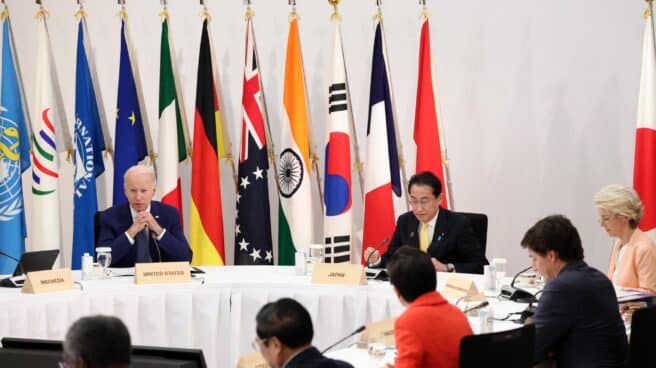

G7 summit in Hiroshima (Japan)
The leaders of the world’s seven most industrialized democracies – the US, Germany, France, Britain, Canada, Italy and Japan – asked the Chinese government on Saturday to put pressure on Russia to stop the war in Ukraine. The statement, signed by the G7 representatives, combines their desire to maintain relations with Beijing and provide for measures to reduce “overreliance on critical supply chains” without achieving a commercial “disengagement” from the Asian giant.
“We remain ready to develop a stable and constructive relationship, while recognizing the importance of a frank and direct expression of our concerns,” international leaders explained in a statement released this Saturday on the second day of their meetings at the Hiroshima summit in Japan.
The G7 asks China to “participate in international forums” on issues ranging from environmental protection to trade, including international conflicts, despite highlighting the “challenges” posed by China with its “non-profit policies that distort the global economy.”
Ukraine stands as one of the fundamental issues of the final declaration: “We call on China to put pressure on Russia to stop its military aggression and immediately, completely and unconditionally withdraw its troops from Ukraine,” the G7 leaders say.
“We call on China to maintain a comprehensive, just and lasting peace based on territorial integrity and the principles and purposes of the UN Charter, including through direct dialogue with Ukraine,” they add.
Continuing on the international stage, the G7 reiterates its position on the status quo in Taiwan, whose sovereignty Beijing has claimed for decades, and expresses its strong opposition to Chinese expansion in the Indo-Pacific region “through the use of force or coercion.” “.
“China has no legal basis to protect its maritime claims in the area, and we oppose the militarization of its activities,” they say.
However, returning to the bigger picture, the G7 leaders want to emphasize that these policy approaches are “not intended to harm China and are not intended to hinder its efforts for economic progress and development.”
“A growing China governed by international rules is in the global interest. We are not separating ourselves,” they add, before pointing out, however, that the G7 plans to take the path of “risk reduction and diversification.”
“We will take individual and collective steps,” they say, “to invest in our own economic viability, and we will reduce over-reliance on critical supply chains.”
Russia condemns ‘efforts to contain’ China’s alliance with Moscow
Russian Foreign Minister Sergei Lavrov denounced that the G7 criticism of China’s economic and military policies, formulated during the Hiroshima summit, was nothing more than an attempt to contain the alliance between Beijing and Moscow and end the policy of “suppression.” , with the “competition” that Russia represents in the international arena.
“The mission sounded loud and clear: it’s not enough to defeat Russia on the battlefield (Ukraine), you need to eliminate this country as a geopolitical competitor,” Lavrov complained at a meeting of the Council on Foreign Policy and Air Defense in the Moscow Region, gathered by Interfax.
Lavrov warned that any other country “claiming some sort of independent position on the world stage” would also fall victim to what he called “the effort of suppression.”
“Look at the decisions that are being discussed and adopted today in Hiroshima at the G7 summit that aim to double deter Russia and the People’s Republic of China,” the minister said after the group’s statement this Saturday. that He criticizes various aspects of contemporary Chinese politics, from economic to commercial, including its expansion into the Indo-Pacific region.
“I want to make it clear that we are not promoting hostility towards anyone, but are forced to respond firmly and fundamentally as a reaction to the war declared on us,” he concluded.
Pope calls for nuclear disarmament
The Pope has written a letter to G-7 world leaders asking them to avoid nuclear rearmament and stop using arsenals of mass destruction as a strategy to guarantee world peace.
“Nuclear weapons and other weapons of mass destruction are a risk multiplier that only creates the illusion of peace,” Francis said in a letter addressed to Bishop Alexis-Mitsuru Shirahama of Hiroshima.
Thus, in a message to the G7 summit, which is taking place in the Japanese city of Hiroshima, he urged “not to underestimate the consequences of the continuing atmosphere of fear and suspicion” between the nuclear powers, which makes dialogue difficult.
For the pontiff, Hiroshima is like a “symbol of remembrance” declaring emphatically that nuclear weapons are “inadequate to respond effectively to today’s serious threats to peace and to guarantee national and international security.”
Source: El Independiente